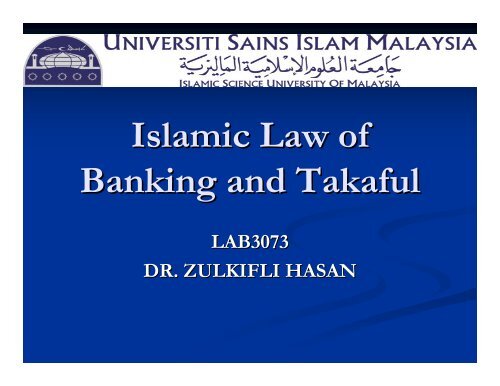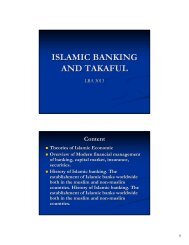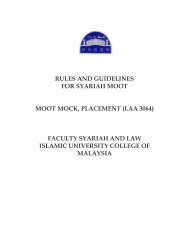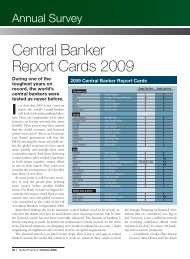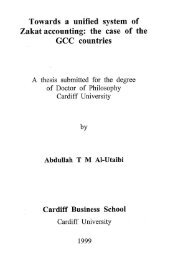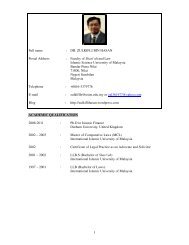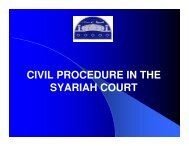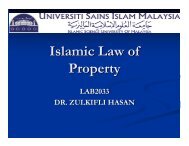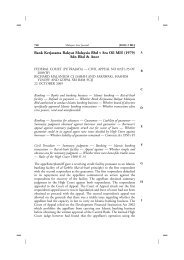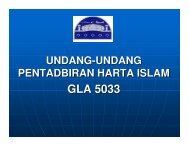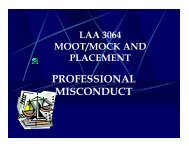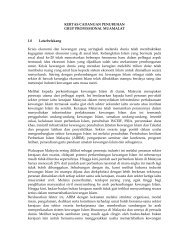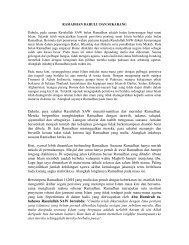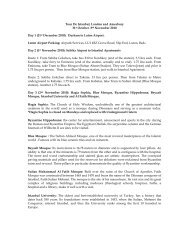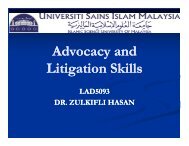Shariah Governance
Shariah Governance
Shariah Governance
- No tags were found...
You also want an ePaper? Increase the reach of your titles
YUMPU automatically turns print PDFs into web optimized ePapers that Google loves.
Islamic Law ofBanking and TakafulLAB3073DR. ZULKIFLI HASAN
How SG complements CG framework in IFIs?
<strong>Shariah</strong> <strong>Governance</strong>BODSHARIAHCOMMITTEEAUDITCOMMITTEECOMPANYSECRETARIALRISKMANAGEMENTCOMMITTEECEO
The Investment DarCompany v BlomDevelopments BankJudgment on BBAKleinwort BensonThe Majma’ Fiqhdeclaration onTawarruqStatement of 85% ofpotentialShari’ahahnon-compliancesukukMisused of funds byBCCIWhy does SG matter?TID claims that the wakala based deposit in the amount ofUSD10m did not comply with the Shari’ahah and therefore shouldbe considered void.The High Court decreed that the profit derived from BBA facilityis unlawful. The defaulters of BBA facility were only liable as tothe original facility amount and not the selling price.One of the factors that lead to the closure of KB in 1986 was dueto investor’s s reservation about the absence of a SB (Iqbal,, 2002:47) .Resolution on Tawarruq at the 19 th meeting in Sharjah, , UAE on26-30th April 2009 which confirmed its impermissibilityHas negated in some way public confidence on legitimacy andIslamicity of the sukuk. . Sales of sukuk dropped 50% in 2008 andprices fell at an average of 1.51% (Kettel(Kettel, , 2008: 38). According toBloomberg, sales of global sukuk had dropped to USD856 millionin 2008 (Sobri(Sobri, , 2008: 16).Due to weak supervision on SG, it is found that BCCI hasmisappropriated the funds obtained from IFIs in non-ShariShari’ahahportfolio (Grais(and Pellegrini, , 2006).
Definition The IFSB-10 defines the Shari’ahahgovernance system as “a a set of institutionaland organizational arrangements throughwhich IFIs ensure that there is effectiveindependent oversight of Shari’ahahcompliance over the issuance of relevantShari’ahah pronouncements, dissemination ofinformation and an internal Shari’ahahcompliance review
Elements of Good Shari’ahah Board
8. AnnualShari’ahreview1. ProductInitiative7. PeriodicShari’ahreview2.PreliminaryShari’ahAnalysis6.Dissemination ofShari’ahrulings5. Shari’ahruling4. Shari’ahreview ofthedocuments3. Legal Documentationand Product Proposal
Mechanism of Shari’ahah AssuranceIssueIndependence of SBCompetency, Conflictof Interest andConfidentialityConsistency of therulings<strong>Governance</strong> ApproachMethod of appointmentClear mandateRestriction on multipleappointmentsTerm of referenceDeclaration in writingTrainingThe adoption of AAOIFI standardsCentralized Shari’ahah board
Disclosure and TransparencyTypes of DisclosureFinancial and RiskDisclosureDisclosure for IAHRisk Exposure andRisk Mitigation<strong>Governance</strong>DisclosureQualitative and Quantitative DisclosureCorporate informationCapital structureCapital AdequacyPolicies, procedures, product design, product type andprofit allocation basis of investment accountsRM objectives, policies and practices, the structure andorganisation of the relevant risk reporting andmeasurement systems, measures and indicators of riskexposures, policies for hedging and/or mitigating risk,and strategies and processes for monitoring thecontinuing effectiveness of risk management tools andtechniques such as hedging and other risk mitigants.The rights of IAHCompliance with Shari`ahrules and principles,Financial reporting in respect of investment accounts
Why? the sake of Shari’ahah compliance Islamic financial products must be genuinely legitimateand comply with the Shari’ahah principles in promoting moderation and justice in financialtransactions and therefore enhancing the publicconfidence in IFIs on the aspect of compliance in itsapplication of Shari’ahah principles meant to address a specific type of risk exclusive toIFIs, , known as Shari’ahahnon-compliance risk.
Institutionalization of Shari’ahah Board The AAOIFI <strong>Governance</strong> Standard No.1 defines aShari’ahah board as “an independent body entrusted withthe duty of directing, reviewing and supervising theactivities of IFIs for the purpose of Shari’ahah complianceand issuing legal rulings pertaining to Islamic bankingand finance” “a a body comprised of a panel of Shari’ahah scholars whoprovide Shari’ahah expertise and act as special advisers tothe institutions”
Cont….. The term <strong>Shariah</strong> Committee or <strong>Shariah</strong>Supervisory Council or <strong>Shariah</strong> AdvisoryCouncil has been used interchangeably forthe past 21 years. IBA 1983 used the term<strong>Shariah</strong> Supervisory Council while BAFIA1984 used the term <strong>Shariah</strong> AdvisoryCouncil. The term <strong>Shariah</strong> Committee hasbeen introduced by Bank Negara Malaysiain the Guidelines and Procedures for <strong>Shariah</strong>Committee issued in December 2004.
History The setting up of the institution of the Shari’ahah boardbegan in 1976 when the Faisal Islamic Bank of Egyptwas established. It was the first to have a formal Shari’ahah board consistingof selected Shari’ahah scholars in Egypt. This practice was then followed by the Jordan IslamicBank and the Faisal Islamic Bank of Sudan in 1978, theKuwait Finance House in 1979, the Bank IslamMalaysia Berhad in 1983, and the Dubai Islamic Bankin 1999.
Models of <strong>Shariah</strong> Board internal and external Shari’ahah boards, where theformer refers to the in-houseShari’ahah board ofIFIs and the latter to the Shari’ahah boards s atnational and international levels, Shari’ahahadvisory firms and individuals undertakingShari’ahah advisory services.
Shari’ahah boards s at Individual IFI LevelThis model is the most prevalent practice of IFIs. . Generally, anIFI is required to establish its Shari’ahah board as stipulated in thearticle of association.The internal Shari’ahah board structure may vary from one board toanother. The objective of the establishment of the Shari’ahah board,as stated in the article of association, determines the nature of itsgovernance structure.This model lets an individual IFI establish its own Shari’ahah board,regardless of its parent or group companies. For instance, HSBCAmanah has a different Shari’ahah board in each of its subsidiariesto suit the legal environment of the local market.
Central Shari’ahah board for the Whole Group Unlike the former model, this model centralizes theShari’ahah board for a whole group of companies.Although IFIs of this model are involved in crossborder transactions, there is one central Shari’ahah boardthat undertakes responsibility for matters pertaining toShari’ahah compliance. This model is practised by theDallah al-BarakaGroup. This model neverthelessseems to be inefficient in most jurisdictions, since asingle Shari’ahah board is incapable of handling numerousShari’ahahissuesfrom various jurisdictions at oneparticular time
National Shari’ahah boardsThere are a few Shari’ahah boards s established by governments,particularly at the national level, either by the central bank or osecurities commission, such as in Malaysia, Indonesia, Brunei,Pakistan and Sudan, or by other government agencies such as theMinistry of Awqaf in the case of Kuwait.Another form of national Shari’ahah board refers to the practice inIran by which the Council of Guardians plays a role as the onlyinstitution that deals with Islamic banking and finance matters.Unlike the model in Malaysia, Brunei, Pakistan and Sudan, whichalso allows the establishment of Shari’ahah boards s at the institutionlevel, the practice in Iran recognizes the Council of Guardians asthe sole Shari’ahahauthorityauthority for IFIs. . All these national Shari’ahahboards s nevertheless have common functions as the highest fatwaauthority for IFIs and aim at harmonizing and standardizingShari’ahah practices and all its decisions are final and binding.
Shari’ahah boards s at International LevelA Shari’ahah board at international level normally refers to anindependent Shari’ahahbodyestablished by the mutual cooperationof several Muslim countries, such as the AAOIFI and the IDB.The AAOIFI Shari’ahah board has different functions from theinternal and national Shari’ahah boards s as it plays a role indeveloping Shari’ahah standards and promoting uniformity ofShari’ahah governance practice.The IDB Shari’ahah board provides internal Shari’ahahadvisoryadvisory servicesto the IDB as well as being involved in developing thegovernance standard of IFIs. . Usually, the composition of theAAOIFI and the IDB is comprised of the eminent Shari’ahahscholars in the world from diverse backgrounds. All of thesescholars are considered as the leading experts in fiqh al muāmalmalātand enjoy high authority in the Shari’ahahaspectaspect of Islamic finance
Shari’ahahAdvisoryFirmsA Shari’ahah advisory firm is an organization which offers Shari’ahahservices, either as a supervisory or consultative function, such as theInstitute of Islamic Banking and Insurance (IIBI), the InternationalInstitute of Islamic Finance Incorporated (IIIF), the IslamicBanking and Finance Institute of Malaysia (IBFIM), Yasaar Limited(YL), the Minhaj Shari’ahahFinancialAdvisory (MSFA), FailakaInternational (FI), BMB Islamic (BMBI) and Taqwaa Advisory andShari’ahahInvestmentSolutions (TASIS).These organizations are business entities and not part of any IFIs asthey provide consultative and supervisory services for variousaspects of banking and finance including matters related withSharīʿahah. . In terms of ownership, the current practice shows thatShari’ahahadvisoryadvisory firms are either owned by independent parties (e.g.IIBI), IFIs (e.g. BMBI and IBFIM), legal firms or even by Shari’ahahscholars themselves (e.g. FI, YL, IIIF and MSFA).
Individuals UndertakingShari’ahahAdvisoryRoles This form of Shari’ahahadvisoryadvisory services is rarelyutilized by IFIs. . In the absence of an internalShari’ahah board, , instead of hiring a Shari’ahahadvisoryadvisoryfirm, IFIs may seek Shari’ahahadvisoryadvisory servicesfrom individual Shari’ahah experts. This model ismore prevalent in the case of Islamic windows,IFIs in non-Muslim countries or small scalecompanies.
AppointmentIn contemporary practice, the members of the Shari’ahah board areappointed by the shareholders in the annual general meeting(AGM) or by the BOD.In actual practice, numerous IFIs appoint members of theirShari’ahah board through their BOD, as in the case of Malaysia andPakistan.The practice is different in the case of the appointment ofShari’ahah board members at the national level where the power isvested in the government, as in the case of the Shari’ahah board ofthe Central Bank of Sudan and Malaysia. In Malaysia, the Shari’ahahboard of the BNM is appointed by the Yang di-PertuanAgong onthe recommendation of the finance minister pursuant to theCBA. On this basis, it can be concluded that there are variouspractices of the method of appointment of the Shari’ahah boardacross jurisdictions.
Composition most IFIs appoint three to six members on theirShari’ahah board. . The AAOIFI Shari’ahah board is composedof not more than twenty members who are appointedby the Board of Trustees for a four-year term fromamong Shari’ahah scholars. The AAOIFI governancestandard requires at least three members at IFI level To ensure that the SC would be able to functioneffectively, the composition of the <strong>Shariah</strong>Committee consist a minimum of five (5) membersand their affairs will be managed by a shariahsecretariat of the respective Islamic financialinstitutions
Qualification Shari’ahah board members are those who are experts inShari’ahahandand law, specifically in the area of fiqh almuāmalmalāt and usul al fiqh. . The reason behind this is thatthe Shari’ahah board mostly deals with the issues relatedwith commercial transactions. The AAOIFI governance standards and the IFSB-10allow the appointment of an inexpert person in fiqh almuāmalmalāt to be a Shari’ahah board member with thepurpose of strengthening the ability of the Shari’ahah boardto scrutinize and understand banking business and itsoperations, as in the case of the SBP and BNM.
Shari’ahah Compliance Review IFIs are required to undertake a Shari’ahah review andinternal Shari’ahah review process for the purpose ofensuring that all transactions are in conformity withShari’ahah principles. The Shari’ahah board examines the extent of Shari’ahahcompliance of the IFIs’ products, activities and businesstransactions, The examination of the extent of Shari’ahah compliance byan independent internal Shari’ahah audit or as part of theinternal audit based on the Shari’ahah rulings, guidelinesand instructions issued by the Shari’ahah board. The Shari’ahah board is normally assisted by this internalaudit unit to review the Shari’ahah compliance aspects inIFIs.
The SAC The main objective of the establishment ofthe SAC is to advise the Islamic financialinstitutions on any <strong>Shariah</strong> matter and alsoto ensure compliance with the <strong>Shariah</strong> tenetsand requirements in their operations
The SAC and National Fatwa Comittee The National Fatwa Consultative Committee forIslamic affairs was established in 1970 and now isunder the administration of JAKIM, PrimeMinister’s s Department. This body has the authority to issue fatwa atnational level to any matter referred by MajlisRaja-rajaraja. Majlis Fatwa Kebangsaan consist ofChairman of the committee, Mufti for each state,five persons knowledgeable in Islamic lawappointed by Majlis Raja-raja and a member oflegal profession or judiciary appointed by MajlisRaja-raja
The SAC and State FatwaCommittee The functions of the Fatwa Committee are todevelop the Islamic law within the jurisdictioninvolving Muslim only. It has to advise the Ruler in all matters of <strong>Shariah</strong>and Mufti will be the chief authority in Islamic lawmatters in that state. The only recognized fatwa islegal rulings published by state Mufti with theconsent of rulers and it has been gazzetted. The SAC’s Resolution binds IFIs, , courts andarbitration.
The Differences between SACand Fatwa Committee Committee Members State Fatwa Committee has their own membersspecifically provided in the Administration ofIslamic Law whereby National Fatwa Committeeconsist of representatives of mufti from all statesincluding selected members appointed by YDPA.State Fatwa Committee will be chaired by Muftiand National Fatwa Committee will be chaired byselected appointed person by YDPA. Open policy for the IFI to choose and appointtheir members of the SAC
Enforcement of Fatwa A Fatwa of National Fatwa Committee andState Fatwa Committee is not binding andenforceable unless and until it is publishedin the state’s s gazette. The SAC’s resolution bindS the court andarbitration to follow its decision.
Subject Matter In selecting the subject matter of fatwa, theformer is subject to three occurrence,namely if it is ordered by the YDPA or if it isupon the request of the general public or onaccord of the Mufti himself. The SAC will issue resolution upon requestmade by the IFI, customer, lawyers and etc.It concerns more on the parties involved inthe banking business.
Cont… The SAC plays an active approach in selecting thesubject matter of fatwa. Working hand in hand with the secretariats ofrespective banks, the SAC has to scrutinize the<strong>Shariah</strong> principles, suiting it to the proposedproduct, and in many instances they have tosuggest for alternatives. The nature of studying the fiqh in the Islamicbanking and takaful industry is also technical andin depth
Cont… Islamic financial institutions are not allowedto appoint any member of the SC in anotherIslamic financial institution of the sameindustry. For example, X is appointed as the SCmember of Maybank Berhad. . A is stilleligible to be appointed as a member ofTakaful Nasional. . This is to avoid anyelement of conflict of interest and also forreasons of confidentiality within theirrespective institutions.
DUTIES ANDRESPONSIBILITIES The primary objectives of theestablishment of the SC are to adviseIslamic financial institutions on anyshariah matter such as to its operation, toanalyse and evaluate <strong>Shariah</strong> aspects ofnew products/schemes so as to ensurecompliance with the shariah tenets andrequirements in their operations.
Concept and Structure of the Products The SC will evaluate the concept andstructure of the new product and willreview the existing products.
Documentation The SC will vet meticulously and endorse allproducts documentation. to endorse and validate all relevantdocumentations and this includes the termand condition, the product manual,marketing advertisement, sales illustrationand brochures used to describe the product.
Business Operations The SC will monitor the Islamic bankingoperations from time to time. advise the bank on shariah matters in orderto ensure that the business operations of theIslamic financial institutions comply withshariah principles at all times. It includesthe procedures for transaction, actualbusiness operations, and system applicableto the banking operations.
To Advice Related Parties On <strong>Shariah</strong>Matter Upon Request The related parties of Islamic financialinstitution such as its legal counsel, auditor orconsultant, branches or even customer mayseek advice on <strong>Shariah</strong> matters from the SC. There will be a syariah unit which administerof all request for the SC’s s deliberation.
To Provide Written <strong>Shariah</strong> Opinion. to record any opinion given. prepare written <strong>Shariah</strong> opinions. This written shariah opinion shall consist ofissues, product structures and features, theSC’s s opinion together with their reasoningfrom sources of Islamic law.
To endorse <strong>Shariah</strong> Compliance Manuals the manual will specify the manner in which asubmission or request for advice be made tothe SC, the conduct of the SC's meeting andthe manner of compliance with any <strong>Shariah</strong>decision. Islamic financial institution shall have a<strong>Shariah</strong> Compliance Manual which shall beregarded as a standard operational procedurefor shariah governance.
To assist the SAC of Central Bank ofMalaysia on reference for advice. to assist the SAC of BNM on any mattersreferred by Islamic financial institution. explain the shariah issues involved and toprovide recommendations for a decision. The explanation and recommendation mustbe supported by relevant shariahjurisprudential literature from therecognized sources.
General Tasks and Duties The SC also will deal with certain generalduties and tasks relevant to their job scopeand this includes to assist the related partieson shariah matter and to determine thezakat policy of the banks. Zakat is compulsory to every Muslim andIslamic institutions such as a bank.


